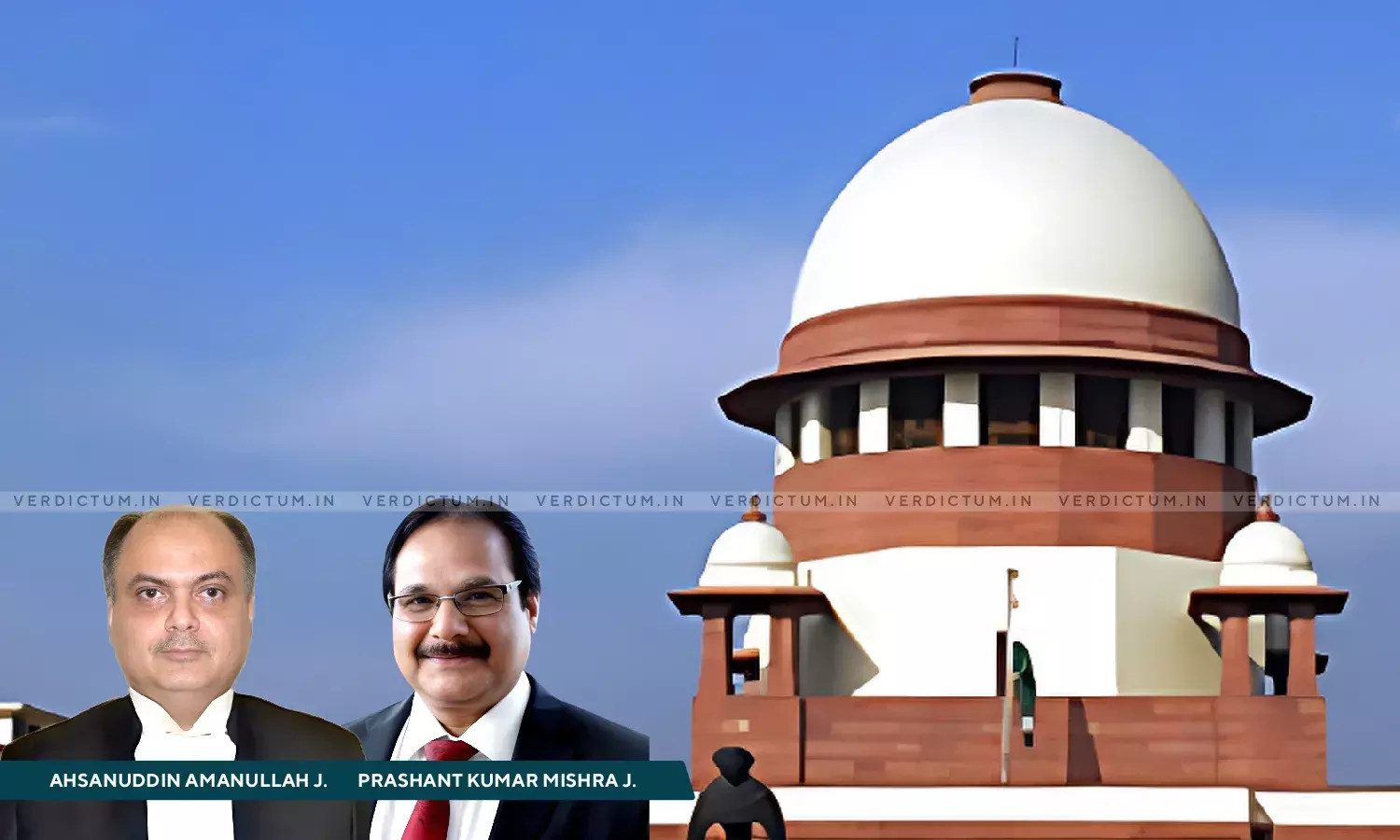Absolving Accused Based On SIT’s Findings Alone Not In Best Interests Of Justice: Supreme Court Allows Appeal Against Order Setting Aside Summons U/s. 319 CrPC
The Supreme Court stated that, indubitably, while an innocent person should not be punished, no guilty person should go scot-free.

Justice Ahsanuddin Amanullah, Justice Prashant Kumar Mishra, Supreme Court
While remarking that absolving additional accused based on SIT’s findings alone is not be in the best interests of justice, the Supreme Court allowed an Appeal challenging the decision of the Punjab and Haryana High Court, which had set aside the Order of Summons under Section 319 of the CrPC.
The Court set aside the Order of the High Court which had set aside the summons issued under Section 319 of the CrPC against the additional accused by the Trial Court. “Indubitably, while an innocent person should not be punished, no guilty person should go scot-free,” the Court remarked.
A Bench of Justice Ahsanuddin Amanullah and Justice Prashant Kumar Mishra held, “The law contemplates and provides for a different outcome under Section 319 of the Code, dependent on the peculiar factual premises of a case. Juxtaposition of the law with the instant factual backdrop reveals as under: It is true that the SIT found no evidence against the private respondents, however such factum by itself puts no fetters on the powers bestowed under Section 319 of the Code. Moreover, eye-witnesses in the Trial Court have named the private respondents as persons present on the site of occurrence. The hardship, were we to adjudge it at this juncture, could be more if the private respondents are not summoned than opposed to if they are.”
AOR Satish Kumar represented the Appellant, while Senior Advocate Gopal Sankaranarayanan appeared for the Respondents.
Brief Facts
The Prosecution alleged that in the FIR, all the Respondents/accused were identified 'in the light of the car' and that the incident was a brutal murder where the deceased was pulled out from the car and then done to death.
Arguments Advanced
The Appellant submitted that the issuance of summons was on the basis of the tentative view formed by the Trial Court, indicating likely involvement of the private Respondents in the crime, and argued that the High Court should not have interfered at such a preliminary stage, especially since the Trial Court had found sufficient material to summon the private Respondents/accused.
The Respondents, on the other hand, submitted that after the FIR was lodged, a Special Investigation Team (SIT) was set up to verify the facts due to the sensitive nature of the incident. The SIT found that the Respondents could not have been at the place of occurrence for cogent reasons, based on witnesses supporting their presence elsewhere and CCTV footage, which is electronic evidence. It was also submitted that the fall-out was due to political rivalry, as the deceased was a sitting Sarpanch.
Court’s Reasoning
The State of Punjab, despite service of notice, did not appear. The High Court was informed that the State's stand was that the private Respondents “have rightly been declared innocent.” The Court noted that the State, in criminal matters, acts as “investigator and prosecutor” and must assist the Courts when called upon to do so, and directed that a copy of the Judgment be despatched to the Legal Remembrancer and Principal Secretary, Department of Legal and Legislative Affairs, Government of Punjab, for information and appropriate remedial steps.
The Court held, “Be it noted, the private respondents will have all defences open to them before the Trial Court to put forth their version of innocence, including by way of resort to cross-examination. Trial being an exercise to unravel the truth, given the depositions before the Trial Court, to absolve the private respondents based on the SIT’s findings alone, to our mind, may not be in the best interests of justice.”
The Court referred to its 5-Judge Bench decision in Hardeep Singh v. State of Punjab (2014) which explained the doctrine judex damnatur cum nocens absolvitur (Judge is condemned when guilty is acquitted) and its relevance to Section 319 CrPC. It was held that, “It is the duty of the court to do justice by punishing the real culprit. Where the investigating agency for any reason does not array one of the real culprits as an accused, the court is not powerless in calling the said accused to face trial.”
“On an overall conspectus, the discretion exercised by the Trial Court cannot be said to be capricious/arbitrary/mechanical in juxtaposition with the facts, subject to the comment supra. But then, this Court cannot be oblivious to the work pressure on the learned Judges manning the District and Trial Courts. When we are satisfied that a case is made out to summon the private respondents, in the totality of the relevant considerations, the order impugned cannot withstand judicial scrutiny and will have to be interdicted,” the Bench explained.
Consequently, the Court held that “the Impugned Order dated 18.07.2024 passed by the High Court is set aside and the Criminal Appeals are allowed. The Trial Court shall issue fresh summons against the private respondents.”
Accordingly, the Supreme Court allowed the Appeal.
Cause Title: Yadwinder Singh v. Lakhi Alias Lakhwinder Singh & Anr. (Neutral Citation: 2025 INSC 420)
Appearance:
Appellant: AOR Satish Kumar; Advocates Jitesh Malik, Anisha Dahiya, Jatin Hooda, Anjana Sharma and Abhay Singh
Respondents: Senior Advocate Gopal Sankaranarayanan; AOR Rajeev Kumar Dubey, Diggaj Pathak and Shrey Kapoor; Advocates Saurabh Singh Chauhan, Shweta Sharma, Naveen Gaur, Vaibhavi Pathak, B. Abishek, Pradyut Kashyap, Shreya Nair, Shivam Harsana Karan Kapoor and Manik Kapoor

